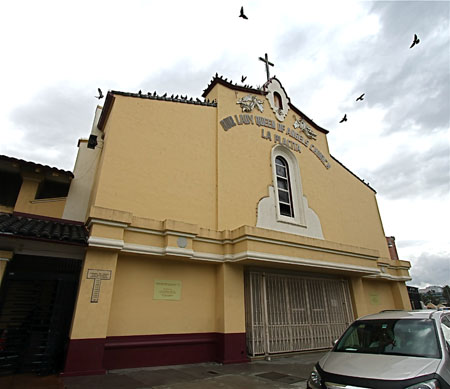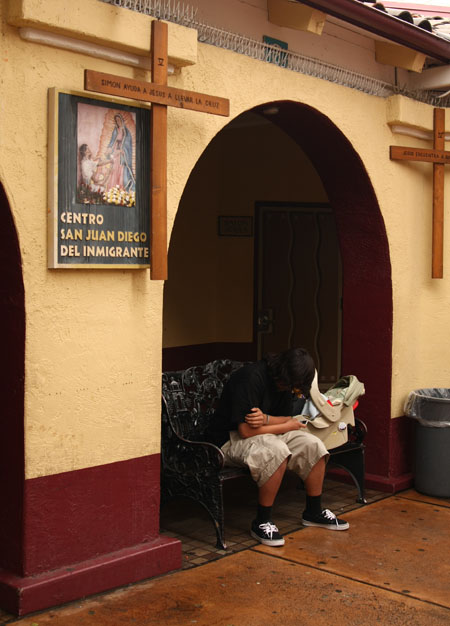Catholic Stakes In The Health Care Debate Are More Than Just Spiritual

A constant stream of people flows through the mission-style plaza at Our
Lady Queen of Angels Roman Catholic Church near downtown Los Angeles.
The church has long been known as a refuge for the poor and
disadvantaged, who flock there seeking help from a wide array of social
services.
At one end of the courtyard, people without the means
to seek conventional medical care line up to see the parish nurse. At
the other end, new and long-established immigrants line up for
workshops on becoming citizens and learning their legal rights.
Frequently, the same people wait in both lines.
"A big
proportion of the people that come to see me are illegal," said parish
nurse, Tim Wright. "A lot of times they come in very sick because they
can't afford health insurance and they're afraid to get help until it's
too late. I've had to send off quite a few people to the emergency room
in cabs."
Our Lady Queen of Angels, known locally as La Placita,
stands at the literal intersection of the Catholic agenda on health
care and immigration reform.
The
Catholic Church, the single biggest religious denomination in the
country with about 67 million members, has thrown its considerable
political weight behind the effort for sweeping health care reform,
calling it a "basic human right" and a "moral imperative." Its position on health care is also deeply intertwined with a longstanding fight
for humane and comprehensive immigration reform, as the Church pushes
to extend health coverage to America's undocumented population.
In
Los Angeles, home to the largest Catholic Archdiocese in the U.S., as
well as one the largest population of uninsured, Archbishop Cardinal Roger
Mahoney has been an outspoken leader in pushing for these reforms.

In an op-ed
published in the New York Times in December he acknowledged all of the
Catholic concerns about the bill, chiefly funding for abortion and
conscience rights that would allow health care providers to decline to
perform services on moral grounds, but focused on the issue of coverage
for the undocumented. He reiterated the "moral imperative" of extending
health care to "immigrants who live in our midst but who do not yet
have legal standing," and cited the economic necessity:
"When
undocumented immigrants are intentionally excluded from health care
coverage, they are forced to go to the only place where they will be
accepted for care: trauma centers and emergency rooms -- the most
expensive health care delivery systems in the country."
And with
the Catholic Church serving as a major provider of those expensive
services, the stakes are more than just spiritual. The Church is one of
the biggest faith-based health care providers in the nation, with a
network of more than 600 hospitals in all 50 states serving more than 5
million people and spending billions of dollars every year providing
free and low-cost care to needy communities.
"Catholic health
care is mission-based, and part of that mission is serving everyone,
regardless of their ability to pay," said Jeff Tieman, director of
Health Reform Initiatives with the Catholic Health Association, a national umbrella group for Catholic health care providers.
"We
want to make sure that everyone gets covered so they can get better
treatment and hospitals aren't saddled with the cost," said Tieman.
"We're not saying faith-based providers can't play a role with the
government, but the problem with the current system is the burden is
not fairly and equally shared."
In California, Catholic health
systems comprise 16 percent of all hospitals, not including the clinics
and parish-based care that, particularly in Los Angeles, largely serve
the low-income, uninsured and undocumented community, as at La Placita.
A study
conducted by UCLA in 2007 found almost 60 percent of California's
undocumented population is uninsured, with Los Angeles County having
among the highest rates and numbers of uninsured in the country -
around 3 million.
Parish nurse Wright said faith-based health
ministries like La Placita are filling in the gap for the uninsured in
what he called the present "unjust system." Private health care
providers do receive some reimbursement from Los Angeles County to
treat poor and uninsured patients, but in February the County Board of
Supervisors voted to retroactively slash the reimbursement rate by a third, from 27 percent to a mere 18 percent effective from last July.
"It
would be cynical to say they just do it because they want more
Catholics," said Wright, referring to the largely Catholic immigrant
population. "But these guys are serious about helping people and seeing
all people as important. There is a spiritual dimension to the work."
Guillermo
Armenta, coordinator of Social Action Ministry at La Placita feels that
spiritual call. "It's an issue of giving everyone human dignity," he
said. "As a Catholic I believe everyone is a son or daughter of God and
should be able to go the doctor when they are sick regardless of when
they came to this country."
For Armenta, that spiritual call
translates into political action. He was recently in Washington, D.C.
at the Catholic Social Ministries Gathering, where Catholic leaders
from around the country came together to discuss pressing social
issues, set a national agenda for the year and bring their ideas to
Congress.
Armenta said health care and immigration reform were
their two biggest issues. In a visit to Capitol Hill they pushed
legislators to move forward on health care legislation that does not
exclude immigrants and to take up broader comprehensive immigration
reform.
"We work towards creating a better world, we work to
save the poor and the weak," said Armenta. "Sometimes that means we
have to work to change government structures so people can have a
better life."



